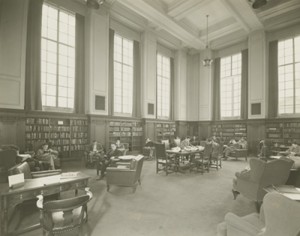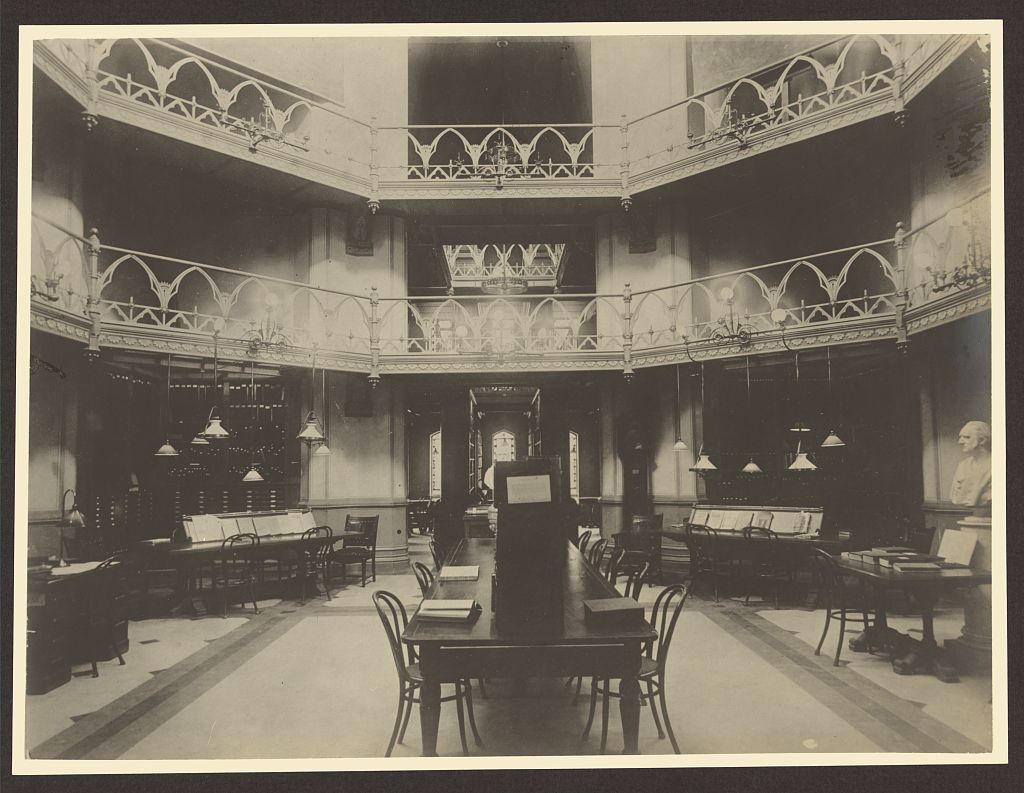
They tell you that you’ll stamp your yellowing time card every day, in and out, in the coatroom. What they don’t tell you is that when the powers that be decide the university needs a grand reading room and totally renovate the space without care for the function of the library itself, the area of this coatroom will be expanded and replaced by a locker room and three bathrooms. The bathrooms will all be down this hallway, and when the toilets are flushed the timing almost always works out such that the door opens for the entire gallery space and reader services desk to get an earful of the toilets. They don’t tell you that the librarian on duty one day will send you to flush the toilet when the people in charge of the project come through so that they might understand how their quiet but echoing gallery space is often overwhelmed by these sounds. You will giggle and run off to oblige. The hand dryers that sound like airplanes taking off will be removed, but the toilets cannot be muffled and the layout has already been decided. Perhaps someday that hallway will get a door.
They tell you that the library houses a multitude of collections, that the RANDOM category of call numbers could mean anything. There is a human skull in a glass bell-jar beside the occult section that flickers under the buzzing green fluorescent lights and is unfortunately in the vicinity of a humidifier that sounds like human breathing. You will learn that humming as you page something in these rows makes the experience a little less frightening. Just a little. You will reprise the song you sang as a child when ducking past the bee’s nest by your back door. They won’t tell you that the antechamber to the magic collection room is pitch black and that the light switch is around the long file cabinets and across the room from the elevator. You will learn to always have your phone flashlight on when you leave the elevator on this floor, but you will still run to the switch to turn it on before the elevator doors close. You will feel a little silly when you call the elevator back and run to the switch to turn it off when the elevator opens. Well, you will feel silly only when the doors open and another person is in the elevator, wondering why you are still across the room from them. “It gets so dark in here,” you’ll mutter through a nervous laugh.
They will tell you that you will find some incredible works in the stacks, particularly as one of the few with card access to this closed-stack library. They won’t be able to capture in words the awe you will feel holding pamphlets from the time of the Stamp Act, a first manuscript page of “O Captain, My Captain,” or fifteenth century publications of Dante’s Divine Comedy. They don’t tell you that you’ll touch these pieces, works that people cannot even ask to be paged and read in the reading room, as you are asked to take down a display or as a librarian pulls you aside to look. They’ll know you well enough to make sure to include you in the moment when something particularly fascinating passes over the desk. They’ll show you the Audubon, double elephant-sized pages with their vibrant and precise paintings of the birds of America spread out nearly as long as you are tall, but they won’t be able to tell you how you’ll feel a special connection to each book you read that mentions Audubons from then on. They don’t tell you the architect will decide there’s no room for the glass case in the lobby anymore and that the book will be locked away.
They tell you that you’ll probably get lost in the stacks. To call the front desk if you ever get stuck between doors. That is, if your phone is still getting a signal. They will joke about giving you a ball of twine for your first few weeks. They will be serious when they say someone will come looking for you if you’ve been gone in the stacks a little too long. They don’t tell you that you’ll spend your last year and a half searching those stacks for the memories you shared with your coworker, giggling and complaining about the patron who seemed to want to page the entirety of the poetry collection in one go. This will be your strongest image of her, alternating between squinting to read out the call numbers in the half-light of the sub-levels and dramatically rolling around on the cement and clouded glass floors. They don’t tell you that this young woman you start working with when the two of you are first years will not be there with you at the end of it all. They don’t tell you that the library is the first place you’ll run when you get the school-wide email in your introduction to international politics lecture. That you’ll key down to the copy room-slash-office and stand, stunned, in front of the only librarian down there at the time. His wife died the year before and you visited his cubicle before and after to talk, left him a card when you heard. You will speak briefly, share a moment of human bewilderment, hug, and leave again, aimless and lightheaded. They don’t tell you that you’ll be the one the librarians ask what happened to her, that you’ll be the bearer of bad news, that you’ll cry with the head of reader services at the small circle gathering the campus chaplain holds. How could they? They don’t know yet either.
What they don’t tell you is that the staff will become your community. The reprieve from the overwhelming 18- to 22-year-old energy of the rest of campus. That the prickly and bitingly sarcastic archivist will take a liking to you. The head of reader services will tell you this archivist is always happy when he’s on desk duty with you. They don’t tell you that you’ll need to step in a couple times when he is about to verbally disembowel the student who invariably comes in asking where he should put his hoverboard, if we can watch his electronic skateboard, if he can order food to the library. It’s a different person every time, but the look on the archivist’s face is the same. You’ll step in to politely manage the situation and hurry the student out of hearing distance before returning to the archivist. “What the fuck,” he’ll say, aghast, and the two of you will roll your eyes and laugh. Conversely, they don’t tell you that the gentle and quiet librarian who folds origami on his breaks and has a soft spot for strays will stand up for you fiercely when a pushy academic man with a white moustache and an overblown ego starts ordering you around. This librarian will tell you afterwards that you don’t have to put up with that sort of behavior, that it isn’t yours or anyone’s job to do so.
They don’t tell you how much you’ll laugh, that the librarians will always swear more than the college students, proper and composed at their first job. You will graduate and a year later have lunch with the librarian you were closest to. Over burrito bowls she will slip you a graduation card to open later. You will realize that the connections you developed there mean something, that, even though they couldn’t possibly have told you this at the beginning, you would consider this experience to have given you some of your warmest memories from these four years. You will know that it’s no coincidence you have been drawn back to libraries time and again during your life, and you will start to believe that there might yet be a path for you in this work.
Well at least, that is, they didn’t tell me.


Leave a Reply